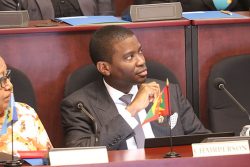ISLAMABAD, (Reuters) – Two large anti-government movements entered the Pakistani capital late on Friday night, presenting the 15-month-old civilian government with its biggest challenge yet.
Former cricketer Imran Khan, who heads the opposition Pakistan Tehreek-e-Insaaf party, and populist cleric Tahir ul-Qadri say they will occupy main streets until Prime Minister Nawaz Sharif resigns.
The unrest has raised questions Pakistan’s stability, at a time when the nuclear-armed nation of 180 million is waging an offensive against Pakistani Taliban militants and the influence of anti-Western and sectarian groups is growing.
Earlier yesterday, a stone-throwing mob attacked Khan’s convoy as he led supporters through the eastern city of Gujranwala. Men brandishing ruling-party posters attacked his convoy, throwing shoes and stones.
Khan’s convoy was shot at but he was not injured, his spokeswoman said. The government insisted shots were not fired, and police arrested 16 activists from the ruling party.
“All those responsible for scuffle will be held accountable,” a government statement said. “There were absolutely no gunshots fired at his rally and such PTI-driven sensationalism is unfortunate.”
In the capital, authorities blocked main roads with shipping containers and barbed wire in a effort to control the marches.





